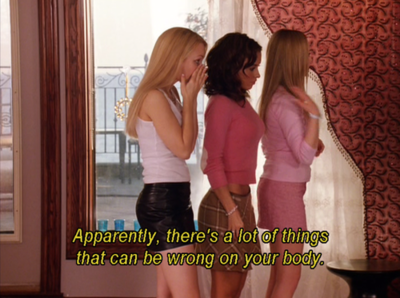Women are in the midst of an important struggle: they must find a way to reject societal and social pressures to be smaller, lesser, and more conciliatory. For years, they’ve been advised in the workplace to “act a little more like men” – to toot their own horns, to negotiate firmly, to proactively seek raises and promotions, as well as more humiliating advice that clearly defines women’s normal traits as undesirable at work. But time has borne out the weakness of that strategy. For all the same reasons that sexism is institutionalized, institutions don’t quite know what to make of women who refuse to get the memo. Backfire ahoy. But that doesn’t mean that women have to give in entirely to their harshest critics: themselves.

In fact, the more tabloids comment on men and women’s weight in equal measure, the more they underscore the shame gap between them. On DiCaprio, extra pounds are incidental to his identity, no more or less damning than the hideous graphic T-shirts and newsboy caps he wears. For women like, say, Jessica Simpson, being photographed at a higher weight is so humiliating and intimate, it necessitates an emotional “weight loss journey,” to be sensitively discussed on a talk show couch later. —You Can Call a Man Fat But You Can’t Fat-Shame Him, by Kat Stoeffel
Like me, the writer of this article has no desire to see the double standard expand to make men as fretful and miserable about their appearance as women. On the contrary, this is one situation where women really should be acting more like men – just brush it off, or perhaps matter-of-factly resolve to take a little more care with their health.
Not their weight – their health. Even the men who get “shamed” in this way are often being shamed for accumulating a bunch of abdominal fat, which is associated with bad health outcomes. (With a “weight problem” bias, certainly, but it’s not a random, idiosyncratic defect.) They aren’t excoriated for the sheer variety of defects that women have learned to accept.
“I used to think there was just skinny and fat, but …

So here is to women discovering the health concerns that are most important to them, and to learning what eating, exercise, and sleep strategies will help them best address those concerns. To discovering meaningful nonscale victories, like better energy level, waking up feeling genuinely good, and thinking more about their individual style than the fashion flavor of the week. We must stop thinking of ourselves as a pile of problematic body parts, and start paying more attention to what matters most to us, whether it’s an engaging career, our families, making art on the weekend, helping with trail maintenance in nearby parks, or any combination of any of them, along with a thousand things I haven’t mentioned.
Rise up, sisters, and be whole. You have nothing to lose but your shame.
